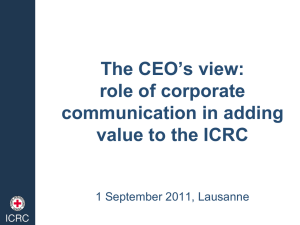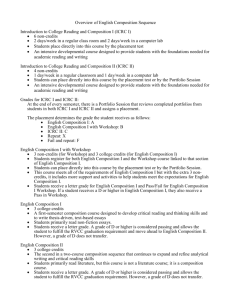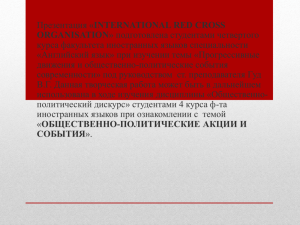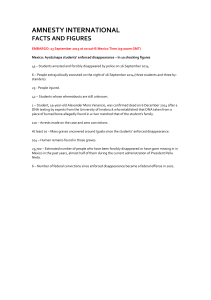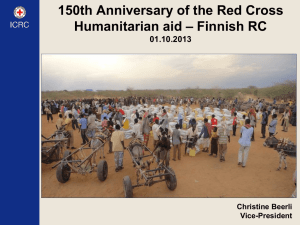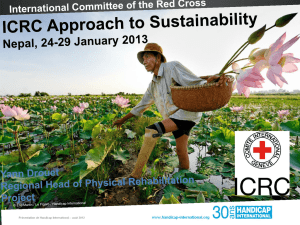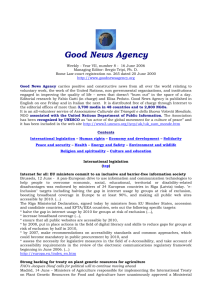ICRC
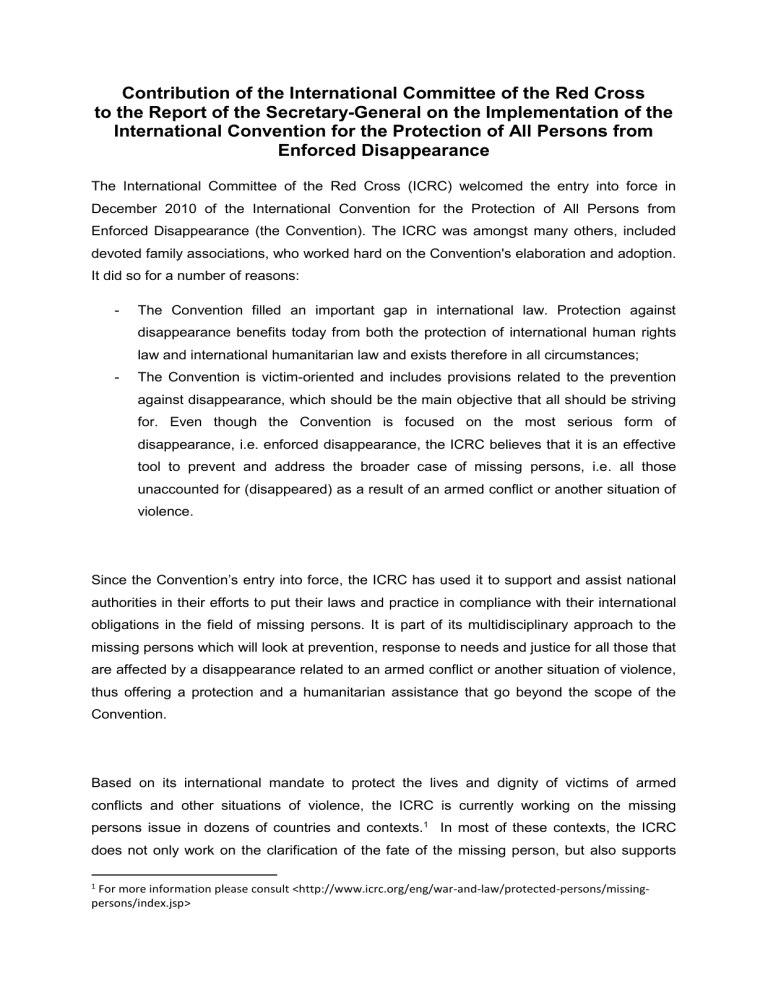
Contribution of the International Committee of the Red Cross to the Report of the Secretary-General on the Implementation of the
International Convention for the Protection of All Persons from
Enforced Disappearance
The International Committee of the Red Cross (ICRC) welcomed the entry into force in
December 2010 of the International Convention for the Protection of All Persons from
Enforced Disappearance (the Convention). The ICRC was amongst many others, included devoted family associations, who worked hard on the Convention's elaboration and adoption.
It did so for a number of reasons:
- The Convention filled an important gap in international law. Protection against disappearance benefits today from both the protection of international human rights law and international humanitarian law and exists therefore in all circumstances;
- The Convention is victim-oriented and includes provisions related to the prevention against disappearance, which should be the main objective that all should be striving for. Even though the Convention is focused on the most serious form of disappearance, i.e. enforced disappearance, the ICRC believes that it is an effective tool to prevent and address the broader case of missing persons, i.e. all those unaccounted for (disappeared) as a result of an armed conflict or another situation of violence.
Since the Convention’s entry into force, the ICRC has used it to support and assist national authorities in their efforts to put their laws and practice in compliance with their international obligations in the field of missing persons. It is part of its multidisciplinary approach to the missing persons which will look at prevention, response to needs and justice for all those that are affected by a disappearance related to an armed conflict or another situation of violence, thus offering a protection and a humanitarian assistance that go beyond the scope of the
Convention.
Based on its international mandate to protect the lives and dignity of victims of armed conflicts and other situations of violence, the ICRC is currently working on the missing persons issue in dozens of countries and contexts.
1 In most of these contexts, the ICRC does not only work on the clarification of the fate of the missing person, but also supports
1 For more information please consult <http://www.icrc.org/eng/war-and-law/protected-persons/missingpersons/index.jsp>
their families based on an assessment of their needs. The ICRC promotes and encourages the ratification and implementation of the Convention through its Advisory Service and offers tailored-made specialist legal advice and technical support to national authorities, upon their request, when incorporating their obligations to prevent disappearances and to account for the missing into national law. To this end, the ICRC facilitates exchange of experiences amongst competent authorities by collecting national laws and case law for their inclusion into a public electronic database. It also developed Guiding Principles/Model Law on the
Missing designed to facilitate legislation to prevent persons from going missing and to protect the rights and interests of the missing and their families .’ 2 The Model law stresses the importance that national authorities adopt legislation in order to ensure that the crime of enforced disappearance is criminalised under domestic law and that criminal proceedings can be initiated by the missing persons or his/her legal representative(s), family members, interested parties or the State authority.
The ICRC continues to draw attention to the plight of missing persons and their families, including the need to become party and implement the Convention, through its website and promotional activities. In the period from July to December 2012 the ICRC was informed that
Colombia, Peru, Mauritania and Samoa became party the Convention; Peru also enacted relevant implementing legislation. The ICRC furthered the issue of missing persons by inter alia delivering statements during the second and fourth sessions of the Committee on
Enforced Disappearances and participated in a private discussion with the Committee on forensic issues in October 2013. It was also pleased to accept an invitation to deliver a speech in an international conference organised in Paris by Argentina and France in May
2012, where its intervention focussed on the complementarity of the protection offered by international humanitarian law and international human rights law. Finally, it participated in an event organised during the second Meeting of States Parties to the Convention in May 2013 in New York.
24 June 2013
2 The Model Law on the Missing can be found at <http://www.icrc.org/eng/resources/documents/misc/modellaw-missing-300908.htm>
